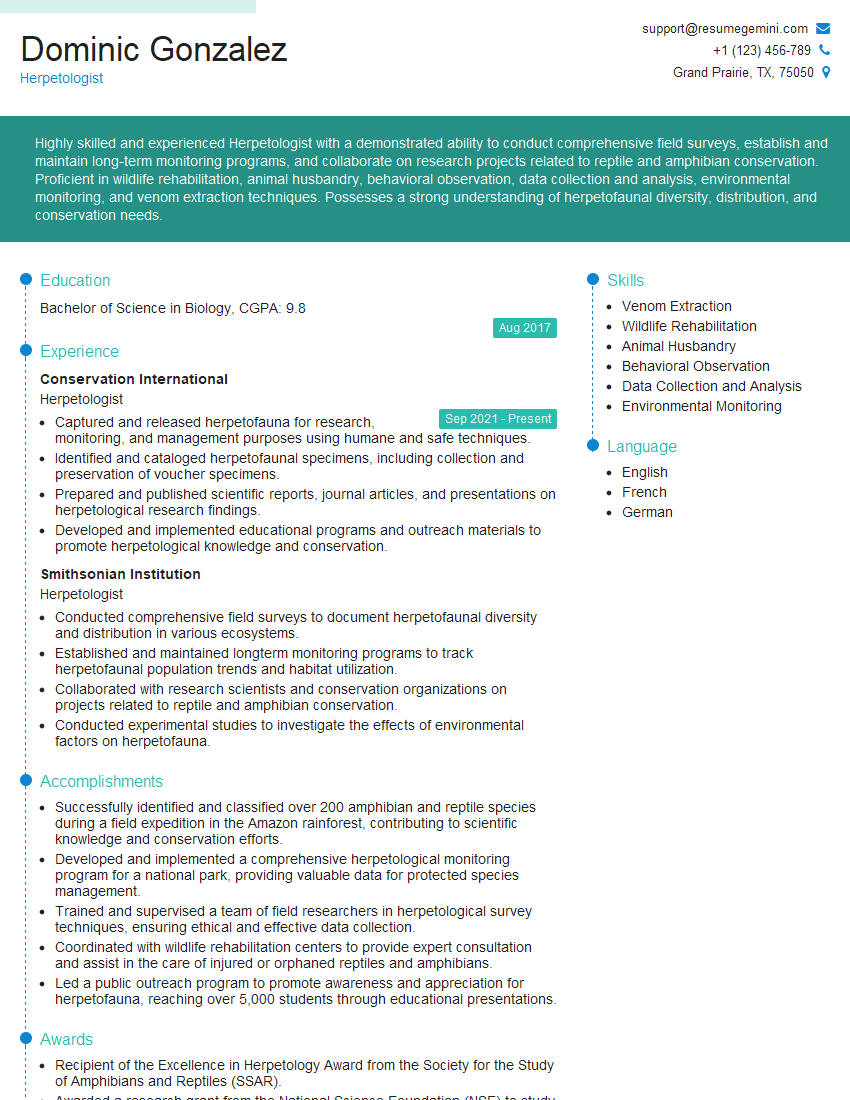Are you a seasoned Herpetologist seeking a new career path? Discover our professionally built Herpetologist Resume Template. This time-saving tool provides a solid foundation for your job search. Simply click “Edit Resume” to customize it with your unique experiences and achievements. Customize fonts and colors to match your personal style and increase your chances of landing your dream job. Explore more Resume Templates for additional options.

Dominic Gonzalez
Herpetologist
Summary
Highly skilled and experienced Herpetologist with a demonstrated ability to conduct comprehensive field surveys, establish and maintain long-term monitoring programs, and collaborate on research projects related to reptile and amphibian conservation. Proficient in wildlife rehabilitation, animal husbandry, behavioral observation, data collection and analysis, environmental monitoring, and venom extraction techniques. Possesses a strong understanding of herpetofaunal diversity, distribution, and conservation needs.
Education
Bachelor of Science in Biology
August 2017
Skills
- Venom Extraction
- Wildlife Rehabilitation
- Animal Husbandry
- Behavioral Observation
- Data Collection and Analysis
- Environmental Monitoring
Work Experience
Herpetologist
- Captured and released herpetofauna for research, monitoring, and management purposes using humane and safe techniques.
- Identified and cataloged herpetofaunal specimens, including collection and preservation of voucher specimens.
- Prepared and published scientific reports, journal articles, and presentations on herpetological research findings.
- Developed and implemented educational programs and outreach materials to promote herpetological knowledge and conservation.
Herpetologist
- Conducted comprehensive field surveys to document herpetofaunal diversity and distribution in various ecosystems.
- Established and maintained longterm monitoring programs to track herpetofaunal population trends and habitat utilization.
- Collaborated with research scientists and conservation organizations on projects related to reptile and amphibian conservation.
- Conducted experimental studies to investigate the effects of environmental factors on herpetofauna.
Accomplishments
- Successfully identified and classified over 200 amphibian and reptile species during a field expedition in the Amazon rainforest, contributing to scientific knowledge and conservation efforts.
- Developed and implemented a comprehensive herpetological monitoring program for a national park, providing valuable data for protected species management.
- Trained and supervised a team of field researchers in herpetological survey techniques, ensuring ethical and effective data collection.
- Coordinated with wildlife rehabilitation centers to provide expert consultation and assist in the care of injured or orphaned reptiles and amphibians.
- Led a public outreach program to promote awareness and appreciation for herpetofauna, reaching over 5,000 students through educational presentations.
Awards
- Recipient of the Excellence in Herpetology Award from the Society for the Study of Amphibians and Reptiles (SSAR).
- Awarded a research grant from the National Science Foundation (NSF) to study the population dynamics of endangered salamanders.
- Recognized by the Herpetologists League for exceptional contributions to the field through research, education, and conservation.
- Received the Herpetologist of the Year award from the International Herpetological Society (IHS).
Certificates
- Certified Herpetologist (CH)
- Certified Wildlife Specialist (CWS)
- Certified Reptile and Amphibian Caregiver (CRACC)
- Certified Veterinary Technician (CVT)
Career Expert Tips:
- Select the ideal resume template to showcase your professional experience effectively.
- Master the art of resume writing to highlight your unique qualifications and achievements.
- Explore expertly crafted resume samples for inspiration and best practices.
- Build your best resume for free this new year with ResumeGemini. Enjoy exclusive discounts on ATS optimized resume templates.
How To Write Resume For Herpetologist
- Highlight your field experience and research skills: Emphasize your expertise in conducting field surveys, monitoring programs, and research projects related to herpetology.
- Showcase your technical abilities: Include specific skills such as venom extraction, wildlife rehabilitation, animal husbandry, behavioral observation, data collection and analysis, and environmental monitoring.
- Demonstrate your conservation knowledge: Highlight your understanding of herpetofaunal diversity, distribution, conservation needs, and experience with conservation projects.
- Obtain certifications and training: Consider obtaining certifications in herpetology or related fields to enhance your credibility and demonstrate your commitment to professional development.
Essential Experience Highlights for a Strong Herpetologist Resume
- Conducted comprehensive field surveys to document herpetofaunal diversity and distribution in various ecosystems.
- Established and maintained long-term monitoring programs to track herpetofaunal population trends and habitat utilization.
- Collaborated with research scientists and conservation organizations on projects related to reptile and amphibian conservation.
- Conducted experimental studies to investigate the effects of environmental factors on herpetofauna.
- Captured and released herpetofauna for research, monitoring, and management purposes using humane and safe techniques.
- Identified and cataloged herpetofaunal specimens, including collection and preservation of voucher specimens.
- Prepared and published scientific reports, journal articles, and presentations on herpetological research findings.
Frequently Asked Questions (FAQ’s) For Herpetologist
What is the role of a Herpetologist?
Herpetologists study reptiles and amphibians, including their biology, behavior, ecology, and conservation.
What are the education requirements to become a Herpetologist?
Typically, a Bachelor’s degree in Biology or a related field is required, followed by specialized training or graduate work in herpetology.
What are the job prospects for Herpetologists?
Job prospects for herpetologists are expected to grow as the demand for research and conservation efforts increases.
What are the key skills required for a Herpetologist?
Key skills include field research techniques, data collection and analysis, wildlife rehabilitation, and strong knowledge of herpetology.
Where do Herpetologists work?
Herpetologists work in various settings such as universities, government agencies, conservation organizations, and museums.